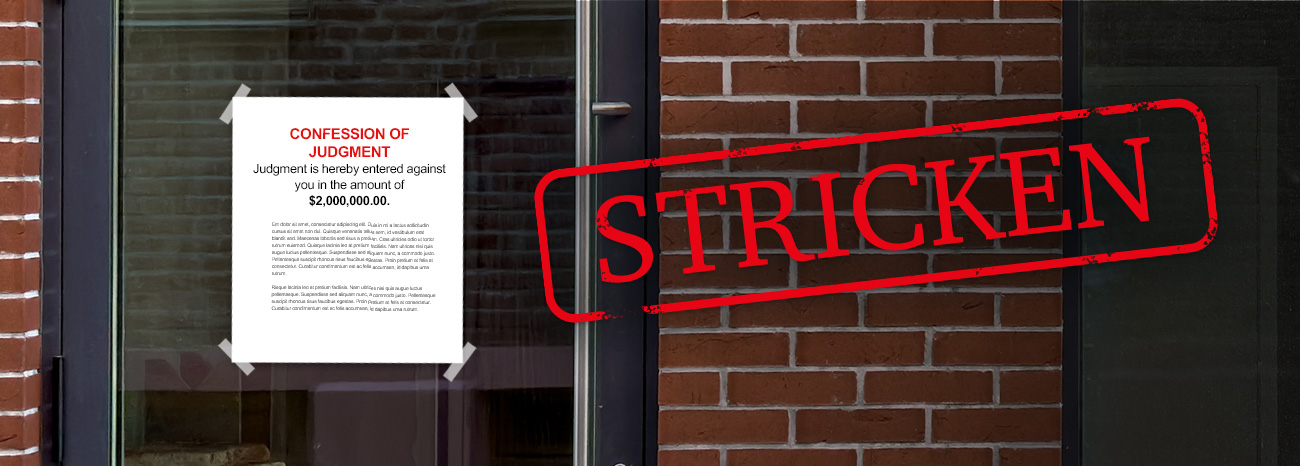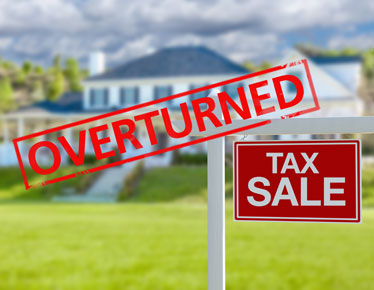Court Strikes $1.875M Confession of Judgment Over SBA Loan Ambiguities

Our commercial litigation team successfully obtained an order striking a $1.875 million confessed judgment entered in Berks County, Pennsylvania, in the matter Firstrust Bank v. 715 Clinton Street, LLC, et al., Docket No. 24-13964.
Involving an alleged default of a Small Business Administration (SBA) loan and related personal guarantees made in connection with the acquisition of commercial real estate, the loan documents contained numerous facial ambiguities related to the confession of judgment provisions.
The SBA documents utilized by Firstrust Bank
- Did not have signature lines made proximately to the confession of judgment clause;
- Stated the confession of judgment in ordinary-sized typeface and not capitalized; and
- Contained the confession of judgment clause under a misleading and generic heading.
Also, the confession of judgment in the SBA documents utilized by Firstrust Bank did not explicitly provide for the waiver of borrower’s and guarantor’s due process rights or right to notice. The Court found these defects in the confession of judgment caused it to be facially ambiguous and unenforceable. The Court held that the confession of judgment must be stricken.
In reaching this holding, in its Order the Court cited to long-standing and recognized Pennsylvania law, explaining that confessions of judgment* are “the most powerful and oppressive contract clauses” and that courts must strictly construe them.
The Court went on to explain that a confession of judgment clause must be self-sustaining, written, and signed by the person to be bound. Further, the Court noted that the required “signature must bear a direct relation to the warrant and may not be implied” and the terms “clear and specific.” Ambiguities, the Court explained, must be resolved against the party entering the confessed judgment.
The Court’s ruling striking the confessed judgment now allows the borrower to state and litigate his defenses against the lender’s allegations of a loan default.
Why This Matters to You
Confessions of judgment can have severe and immediate consequences for both businesses and individuals, including swift entry of large judgments without typical due process safeguards. As demonstrated by the Court’s decision, even seemingly minor drafting errors or ambiguities can dramatically alter the enforceability of a confession of judgment.
If you or your business encounters a confession of judgment, prompt legal action is critical to protect your rights and to challenge possible defects in the loan documentation. Experienced counsel may be able to help you.
Take Action Now
If you have questions about confessions of judgment—or if a confession of judgment has already been entered against you or your business—protect your rights immediately. Contact Eric B. Smith, Esquire at 215-540-2653 or esmith@timoneyknox.com. Acting quickly could be the critical difference in preserving your legal options and safeguarding your interests.
Mr. Smith, a partner of Timoney Knox, LLP, serves as Chair of the Firm’s Litigation Group and has been consistently recognized by Super Lawyers and Best Attorneys since 2005. In 2017 Mr. Smith served as the President of the Montgomery Bar Association. His commercial and real estate litigation practice involves complex matters and spans across the Commonwealth of Pennsylvania.
*The term “warrant of attorney” is another phrase meaning “confession of judgment clause.”
Timoney Knox's Real Estate Litigation Group
Timoney Knox has real estate attorneys experienced in buying and selling property; in mortgaging and borrowing against real estate; in interpreting and applying the wide variety of local land use and zoning laws; and in representing the needs and concerns of individuals as well as homeowners’ associations, condominiums, and planned communities.

Real Estate Law
Tax Sale Overturned
Our real estate litigation team successfully overturned an Upset Tax Sale in Fayette County, Pennsylvania. Have you been affected by improper notice of a tax sale, or lost your property as the result of a tax sale?
Read More
Real Estate Law
An Overview Of Adverse Possession In Pennsylvania: Open, Exclusive And Hostile
Explore the principles of adverse possession in Pennsylvania: legal requirements, from actual, visible possession to the statutory periods and exceptions.
Read More
Commercial and Civil Litigation
Reversed: Short-term Rental Regulations Declared Void and Unenforceable
The real estate litigation team at Timoney Knox prevailed on appeal in the case of Chan, et al., v. The Association of Property Owners of The Hideout, Inc., involving a group of Homeowners challenging unauthorized regulations restricting short term rentals adopted by The Association of Property Owners of The Hideout, Inc. The Commonwealth Court of Pennsylvania reversed the Wayne County Court of Common Pleas and remanded the case to that court with instructions to enter a declaratory judgment voiding the STR regulations rendering them unenforceable.
Read More





